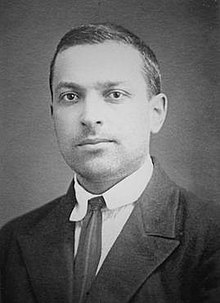This article has multiple issues. Please help improve it or discuss these issues on the talk page. (Learn how and when to remove these messages)
|
Lev Vygotsky | |
|---|---|
| Лев Выготский | |
 | |
| Born | Lev Simkhovich Vygodsky November 17 [O.S. November 5] 1896 Orsha, Mogilev Governorate, Russian Empire (now Belarus) |
| Died | June 11, 1934 (aged 37) Moscow, Russian SFSR, Soviet Union |
| Citizenship | Russian and Belarusian |
| Alma mater | Imperial Moscow University Shanyavsky Moscow City People's University |
| Known for | Cultural-historical psychology, zone of proximal development, inner speech |
| Spouse |
Roza Smekhova (m. 1924) |
| Scientific career | |
| Fields | Psychology |
| Institutions | Moscow State University |
| Thesis | The Psychology of Art (1925) |
| Notable students | Alexander Luria |
Lev Semyonovich Vygotsky (Russian: Лев Семёнович Выготский, [vɨˈɡotskʲɪj]; Belarusian: Леў Сямёнавіч Выгоцкі; November 17 [O.S. November 5] 1896 – June 11, 1934) was a Soviet psychologist, best known for his work on psychological development in children and creating the framework known as cultural-historical activity theory. After his early death, his books and research were banned in the Soviet Union until Joseph Stalin's death in 1953, with a first collection of major texts published in 1956.
His major ideas include:
- The Social Origin of Mind: Vygotsky believed that human mental and cognitive abilities are not biologically determined, but instead created and shaped by use of language and tools in the process of interacting and constructing the cultural and social environment.[1]
- The Importance of Mediation: He saw mediation as the key to human development, because it leads to the use of cultural tools and becomes a pathway for psychological development through the process of interiorization.
- The Zone of Proximal Development: Vygotsky introduced the concept of the ZPD which refers to the gap between a child's current level of development and the level they are capable of reaching with tools provided by others with more knowledge.
- The Significance of Play: Vygotsky viewed play as a crucial aspect of children's development, as he thought of it as the best sandbox to build and develop the practice of mediation.